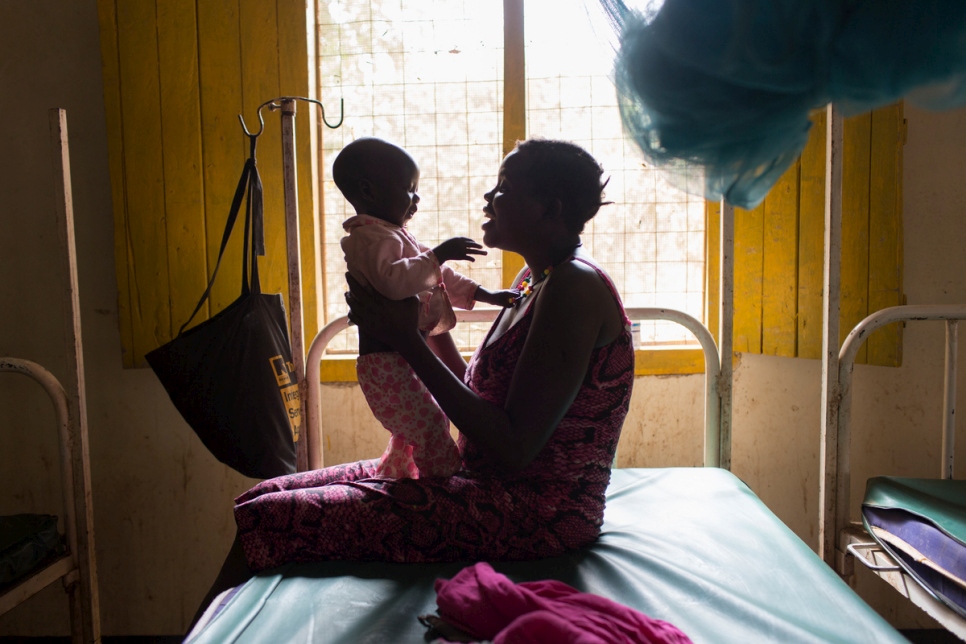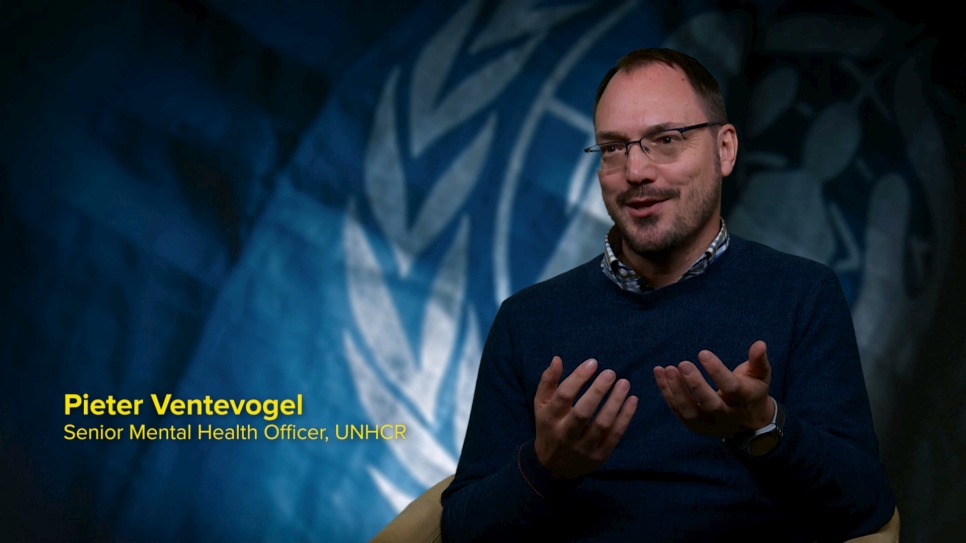Q&A: Far from being traumatized, most refugees are 'surprisingly resilient'
The words 'trauma' or 'traumatized' are often used to describe refugees, but UNHCR's Senior Mental Health Officer Pieter Ventevogel says most in fact cope with adversity.

Refugee Regina Maniro plays with her nine-month-old son Jima Loday at the stabilization center in the Kakuma Refugee Camp Hospital, Kenya, in 2016. They fled their home in South Sudan after poor rains led to failed harvests and food shortages. © UNHCR/Will Swanson
GENEVA – For those fortunate to live in comfort and safety, the psychological impact of being driven from your home by war, persecution or disaster is difficult to imagine. The word ‘trauma’ is often loosely used to describe the harrowing effects of flight and its aftermath on the forcibly displaced, although the reality is more complex. Mental health studies show that the large majority respond with “normal distress” to displacement. A smaller proportion – no more than one in five – present mild or moderate forms of mental problems, including moderate Post-Traumatic Stress Disorder (PTSD). Some three to four per cent suffer serious disorders, such as bipolar disorder or psychosis. UNHCR’s Senior Mental Health Officer, Pieter Ventevogel, sat down with global website editor Tim Gaynor in Geneva to talk about the realities of mental distress in displacement.
According to the World Health Organization, the vast majority of the millions of forcibly displaced people respond to leaving their homes, their jobs, sometimes even their families, in ways described as 'normal distress.' What is a normal reaction to losing everything?
People who are forcibly displaced or are in other kinds of humanitarian emergencies have often faced horrible events, there’s no doubt about that, and that makes people unhappy. What else would you expect if your house is destroyed, you have to escape, your whole social world has collapsed? What we see is that many people – for example in new refugee crises – are upset, they are distressed, they can’t sleep well, they feel angry, they feel sad. I think that is all quite understandable and not abnormal in itself, because people continue to go on with their lives, they try to make something of their lives. It is an understandable, predictable reaction that will subside or go away when things get better.
Are you surprised by how resilient refugees prove to be?
Very much so. I often think when I’m visiting refugee settings, 'What would I do in that situation? Would I be able to cope with all the poverty and lack of prospects, or the lack of services?' So, yes, I’m surprised by the resilience of people, the way people are able to continue and to thrive in the context of adversity. People are often able to still make something of their lives and that is amazing. The thing is, we need to foster that. Just sitting and waiting until food is distributed to you, until your house is given to you, is not good for people. It makes people dependent, it makes people lose their vitality. Now we talk about involving refugees in the aid response, and for me, that it is perhaps one of the most important mental health interventions that you can do.
While many people prove to be remarkably robust, forced displacement can cause psychological damage. At the milder end of the spectrum, what kind of disorders are most common, and how prevalent are they?
We don’t have very accurate data because the contexts are so different. The situation of Darfuri refugees in Chad is very different from the situation of Rohingya refugees in Bangladesh. What in general we can say is that around 15-20 per cent of displaced people have mental health problems, and most of them on the mild part of the spectrum.
I think the single most important mental health problems among refugees have to do with loss and grief, which sometimes may lead to depression. People have lost a lot of things – of course dear ones, but also material things, and also status, immaterial things, ‘being someone.’ Refugees have had so many experiences of loss. That to me is actually the central issue in refugee-specific mental health problems.
The word ‘trauma’ is often used by the media to describe the psychological state of those uprooted by war and persecution. How helpful is the term?
There is a difference between having experienced horrible events and ‘being traumatized.’ Being traumatized means to me, in a clinical sense, something very specific. The central emotion in PTSD is – well, the word says it – stress. People are stressed in a situation where actually the stress factor is not there anymore. It leads to vivid recollections of what happened. So people dream about it, people think about it all the time. It comes back to them what they don’t want. It’s is a very distinct syndrome, and I think it is not so helpful to use that terminology to label a whole population. What you do is that you label a whole population as mentally ill. Implicitly you say there is something wrong with those people, and they need help. We can use other words instead of trauma. We can say that people have experienced bad things, they have lost a lot – that is much less pathologizing.
In any context, some people will experience severe mental disorders like psychosis, severe depression or bipolar disorder. How does the additional stress of displacement impact them?
A person with that vulnerability may remain without symptoms when the situation around him is good. So, imagine a person in a village or town, with his family, the situation is stable, he knows the people around him, the people know him. It’s all going quite well. Imagine now that that person has to flee because everything around him is destroyed, people are killed, and that person finds himself in a large refugee camp, with unknown people. All the elements of security that the person had around him are gone. That may then lead to that person getting the symptoms of a severe mental disorder. In every society you have people with severe mental disorders, around two or three per cent, and we see that in refugee settings it goes up to three or four per cent. It’s still not very many people, but it goes up. That is important, because it is a protection issue. People who have a psychosis of bipolar disorder are really very vulnerable to human rights abuses and often cannot easily fend for themselves.
What can be done to identify and meet their needs?
It is important for people with severe mental disorders to have access to good medical care. They need to be seen by a psychiatrist or psychiatric nurse – a mental health professional. The problem is that in many of the places that we work, those professionals are not easily available. So what needs to be done in my opinion is to train non-specialists. We call that ‘task shifting.’ It means that in every health centre, one doctor or one nurse needs to be trained in identifying and managing people with mental health problems. That doesn’t have to take five or six years as it took me to become a psychiatrist. You can do brief, very focused training, so that non-specialists can do a lot.
The other thing is to motivate people to seek treatment. People with severe mental disorders may not always do that by themselves. So you need to work closely with community leaders, with religious leaders sometimes, with women’s groups, with youth groups, to identify the people in their community who suffer from severe mental health problems and help them access treatment and help families to assist them and motivate them for treatment.
I strongly believe that some of the most powerful mental health interventions are not medical, but are related to empowering people and strengthening support within refugee communities. We shouldn’t forget that refugee communities are to some extent artificial communities. They are brought there by chance, by accident. So they need support to recreate social connections. That should be the first thing. It has been a long way for me as a medical doctor, that it is actually not just healing what is inside the mind, important as it is, but it’s also helping the relations between people to flourish. Within UNHCR this is one of the central elements of what we call Community Based Protection.
You can find more information about mental health and psychosocial support for refugees and other persons of concern here.

